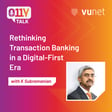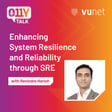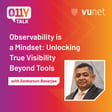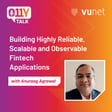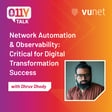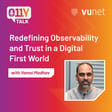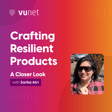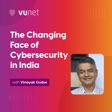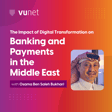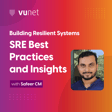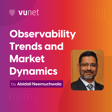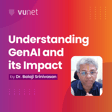Become a Creator today!Start creating today - Share your story with the world!
Start for free
00:00:00
00:00:01

Episode 14: Leadership Strategies for Digital Transformation: Navigating AI, Observability and Automation
We welcome Krishnakumar Natarajan (KK), co-founder of Mindtree and managing partner at Mela Ventures in the latest episode of Observability Talk. KK shares key leadership strategies for successful digital transformation, emphasizing top-down strategy, stakeholder alignment, and cross-functional execution.
He highlights the pitfalls of a tool-first approach and the need for observability to ensure a seamless customer experience and regulatory compliance. We explore the future of IT operations with AI and automation, predicting a hybrid model of self-healing systems with human oversight.
Show Notes
- Krishnakumar on LinkedIn - https://www.linkedin.com/in/krishnakumarnatarajan/
- About Mela Ventures - https://melaventures.in/
Book Recommendations
- The Hard Thing About Hard Things by Ben Horowitz - https://www.goodreads.com/book/show/18176747-the-hard-thing-about-hard-things
- What I Learned About Investing from Darwin by Pulak Prasad - https://www.goodreads.com/book/show/62792694-what-i-learned-about-investing-from-darwin
Transcript
The Evolution of Personalized Technology
00:00:00
Speaker
I think it's possible to in a way generate an experience which is so uniquely customized for this person. and Which even one or two years back, it was impossible to do that.
00:00:12
Speaker
so So I think that's the way I see technology sort of going. Where we look at it as more a generative source of intelligence. Where the intelligence is coming in across in terms of several other sources of information which are available.
00:00:29
Speaker
And then it packages it and gives it to us in simple sachets of easily consumable manner.
Introduction to Observability Talk with Krista Kumar Natarajan
00:00:48
Speaker
everyone. Welcome to a new episode of Observability Talk. Through this podcast, we often aim to look at observability from different perspectives of SRE, development architecture, product owner, or a business leader.
00:01:03
Speaker
Check out of our earlier episodes in the podcast platform of your choice. Today, we are glad to introduce you to Krista Kumar Natarajan, usually referr referred to as NKK or KK, depending upon which timeline you have worked with him.
00:01:19
Speaker
KK is a co-founder and managing their partner at Mela Ventures. Mela Ventures is a B2B technology focused fund, predominantly investing in technology-based early stage startups.
00:01:32
Speaker
He's a leading authority in the global IT sector. He co-founded Mindtree in 1999 and has played key roles in building the company's innovative approaches to delivering IT services and solutions to global 2000 enterprises.
KK's Career and Impact on Startups
00:01:48
Speaker
Apart from building the startup ecosystems, he has been an active angel investor and has made more than 30 investments in a wide range of technology-driven companies across consumer products, healthcare, logistics, and financial services.
00:02:06
Speaker
He also mentors high-growth startup CEOs, helping them with approaches to the market, making the right technology choices, organizations, people, and fundraising.
00:02:18
Speaker
Mela Venture has invested in VueNet as part of our first institutional route and KK has been a source of constant guidance and support for us.
Leadership Strategies for Digital Transformation
00:02:29
Speaker
ah Good morning KK, a warm welcome to Observability Talk.
00:02:33
Speaker
Thank you so much Varath. It's a pleasure for me to share some of my thoughts on the whole space of observability which is becoming so critical for customers. Sure.
00:02:45
Speaker
um KK, you have been deeply involved in driving digital transformation across several organizations, particularly at Mindtree. Many enterprises struggle with large-scale digital transformation.
00:02:57
Speaker
ah In your experience, whatever work you have done, ah what are some of the key leadership strategies ah that you have seen make the difference between a success and a failure? That's a very interesting question, Bharat.
00:03:10
Speaker
In fact, beyond Winetree, I've had the, I would say, absolute pleasure and privilege of engaging with large organizations which have been going through this whole digital transformation and how do they really make it work for them.
00:03:27
Speaker
Wow. My understanding is that I think there is a set of organizations which I would think are more reactive. What I mean by that is they see competition doing something and then they quickly want to, in a way, replicate some of that or provide something which is similar to that.
00:03:49
Speaker
which means there's really a more short-term thinking of saying, hey, what can we do in the next 45, 90 days? Right. While it might give some initial sort of success, um those don't tend to stay because ultimately I think...
00:04:05
Speaker
leadership needs to clearly have a view on their digital strategy and have a framework for prioritization.
Aligning Stakeholders for Transformation Success
00:04:14
Speaker
So the first key factor which I think makes digital transformation successful is really it is from the top and they have a very clear thinking and a strategy for how they'll do and how they really execute on that.
00:04:31
Speaker
I think that's very, very key. Yeah. Having said that, the second key thing, even between organizations which have a digital strategy and at the same time there are others who even have a similar strategy but do better, what is it that's different between these two companies?
00:04:51
Speaker
that The one which I see work very well is where organizations ultimately want to leverage digital transformation, want to grow much faster. Right. And the second thing is to enhance their customer experience.
00:05:07
Speaker
Very true. I've seen companies which really engage the customer early on in the process of even transforming some of the underlying process to a more digital first approach. Right.
00:05:21
Speaker
And here in Mindtree, I think we had a very interesting, ah what else call intervention, which we thought worked very well. la In fact, in our key markets, we built infrastructure, what we used to call the digital pumpkin.
00:05:36
Speaker
now which has a whole set of both hardware and software infrastructure. wrap But the idea was that when you're embarking upon a digital transformation, say, I want to enhance my customer experience.
00:05:50
Speaker
i Right. Get in all the relevant stakeholders. Get in the customers. ah Get in the product team. Get in the manufacturing team. Get in the finance team. Let all the stakeholders who contribute to that end moment of truth for the customer, which is better customer experience,
00:06:08
Speaker
They spend four, five days thinking through all aspects of it. What is the process change which I required? will they go about implementing it? They actually build a small prototype yeah saying, hey, this is how I want to look. So that there's a lot of alignment from all the stakeholders.
00:06:24
Speaker
Right. Then they do the work of taking it to the business to get ah budget sanctions
Avoiding Pitfalls in Digital Transformation
00:06:29
Speaker
and so so on. now So the need to really get in diverse stakeholders aligned to what you are trying to do through digital transformation, I think is the second key aspect yeah which makes a big impact in terms of such success.
00:06:45
Speaker
so The third is really the execution part. To me, many organizations think of digital transformation the work of the CIO. So as long as I've given my requirements this niche way, it never happens that way.
00:07:00
Speaker
It is not an IT infrastructure is issue. It is a business problem which is being solved. And to that extent, Trying to get multifunctional teams as a part of the execution strategy is again another distinction which I think has worked very well for many customers.
00:07:22
Speaker
Thank you, KK. This is pretty interesting, right? Like said, three-step approach to digital transformation. and But I would just insist a bit more on the failure part.
00:07:34
Speaker
ah One thing, but what I have realized is people generally understand the success part very well. But the I would like you to ah identify at least one pitfall people generally get into when they are doing some of these digital transformation strategies for their enterprises.
00:07:51
Speaker
what they should definitely avoid or what they generally get into it but should definitely avoid? No, that's a great question. Because what happens is since technology changing so fast, so I think top management really has, yeah I would say, almost a sense of awe or a fear for technology.
00:08:11
Speaker
So when one of their compet competitors does something and clients even sort of start yeah demonstrating their comfort with that, There are companies which get ah really driven by that. So they want to deliver some
Beyond Tool-first Approaches
00:08:25
Speaker
quick results.
00:08:26
Speaker
So either they just want to deliver a copycat of that. But what they don't realize is, I think a solution is in the context of their company, their sort of infrastructure and data which they have.
00:08:39
Speaker
And their customer needs may also be a little different. now So rather than just following copycat approach, how do you take that as an idea and necessarily make it relevant for your target segment of customers and for your internal organization?
00:08:59
Speaker
That, I think, is a key thing. So one point of failure which I really think is just trying to rush into it without thinking through how it will really be successful in there in your context.
00:09:14
Speaker
The second key thing is, I think distinctly all this involves resources. so So you can't expect something to come out of it. So saying that, oh, we have invested last year 10 crores on SAP implementation.
00:09:30
Speaker
and They have put in enough money in technology. Has no bearing in terms of another digital transformation initiative. So many times top management needs to realize that yes, there is an investment. It's a step investment.
00:09:45
Speaker
And you will get Very good return on investment if you're willing to wait for some time. I think that's very, very key. Very nice.
00:09:55
Speaker
ah See, just extending this same question to another part, people generally talk about that success of any project depends upon the preparation people do. Correct.
00:10:06
Speaker
What you talked about, the thinking through of everyone going into what exactly needs to be done. How would you recommend people prepare for digital transformation initiatives?
00:10:18
Speaker
um Is there any specific things they should worry about when when they are really looking at, like you said, right? Everybody has to thinking through part. So what would you recommend there?
00:10:31
Speaker
See, I think the biggest danger is what I call tool-first approach. yeah and Because, again, if you go back to the area of saying I want to enhance customer experience, and if at the top management level they know a few people in Adobe who come and sold Adobe's customer experience manager,
00:10:51
Speaker
Then, invariably, the director is saying, hey, I think it looks good, so let us use it, have which is what I call a tool-forward approach, which I think is almost a detriment to success.
00:11:04
Speaker
Because for all you know, I think you need to configure something that's appropriate for your organization, your customers, not necessarily get fixated on a tool,
00:11:16
Speaker
But really do what is relevant. Say at the end of the day, when together you build a stakeholder alignment on what you're trying to achieve. And if that tool becomes the best way to implement it, then it's fine. Because you at least have a sense of aligned purpose of people and they'll work to make it happen.
00:11:35
Speaker
But the moment it you just start with the tool, then even from planning perspective, you start thinking about the constraints of the tool, not necessarily a customer backwards approach, but you are really taking a constraint forward approach, which again will make your initiative far less productive and impactful more than anything else.
00:11:58
Speaker
So I think this whole reason for avoiding a tool first approach is very critical. The ability and the need to invest in, I would say, multi-stakeholder engagement to really come to an aligned view in terms of what you're trying to do.
00:12:16
Speaker
I think that's critical. And of course, the right type of execution resources to make it happen. Of course, there'll be some level of governance also which needed to be done.
00:12:28
Speaker
now Unlike maybe your traditional things where maybe you might review the IT function once in two years or once or twice in a year or something. Here, I think these are things which require constant review by top management.
Observability in Digital Transformation
00:12:43
Speaker
So probably in a governance structure where you say every four weeks we'll review this, see what are the constraints, how do I demonstrate top management support for the initiative by clearing some of the bottleneck.
00:12:57
Speaker
Those become very critical for execution success. Thank you, KK. See, this ah oh overall digital transformation, most of these enterprises are doing ah either for getting more customers onboarded or improving their customer experience, right?
00:13:15
Speaker
ah What we have been talking to our customers, most of these digital-first businesses, ah the businesses who are focusing more on the digital channels, right? Right. We believe that observability has becoming a critical component but while designing some of these digital transformation initiatives for these enterprises.
00:13:34
Speaker
Yes. To hear your thoughts on this, as well as your most recent reviews, because you have been talking to a lot of enterprises, did you find observability as one of the critical components for these digital transformation initiatives?
00:13:51
Speaker
I think that's an important question. Again, here, if we trace the whole, I would say, manner in which digital consummation initiatives also happen, I think it started with a broad objective of enhancing customer experience.
00:14:08
Speaker
oh But then that was just limited to one area. When I say that one area, if you look at saying one of our earliest engagements was to rent a car.
00:14:20
Speaker
So it is only with respect to the reservation system of Avis. The customer came, he looked for, because it was only talking to that one reservation system.
00:14:31
Speaker
yeah like And he booked a car for car. But from there, think it's also expanded. Today, when a customer comes into your site, he not only wants to a sort of book a car, he also wants to make payment, which means that reservation system needs to talk to a card acquiring system and potentially maybe a bank.
00:14:55
Speaker
So the... digital system itself is becoming multi sort of well functional. So multitude of things need to talk to enable the end customer experience. um What I think people haven't adequately realized is that how important it is to give a seamless, pleasant experience to the customer.
00:15:19
Speaker
Because at the back, you have many systems talking to each other a point failure can be any one of them. ah To that extent, I don't think people are adequately aware or getting ready.
00:15:34
Speaker
I think there needs to be an education in terms of saying, hey, you're not dealing only with a closed loop, your ah enterprise system. You're today talking to multitude of systems.
00:15:46
Speaker
Some of them will be external. And consequently, you need to trace that customer transaction real time all through the time the transaction happens, which is where observability becomes very critical.
00:16:00
Speaker
I think the awareness levels with more nuanced users is getting better. But if you ask me if an average enterprise who's sort of thinking in terms of enhancing consumer experience, do they think through that whether they need an observability tool? I don't think they even understand that.
00:16:20
Speaker
So there is a lot of education which needs to also happen. Right. And I completely agree on that point. ah ah That was one of the reasons why we started this podcast to make people aware that why observability is very critical.
00:16:37
Speaker
And this should be their thought process from day zero rather than doing sort of an afterthought ah once the application is up and running. And then they realize, oh, we do not have visibility into how my application is performing.
Boardroom Awareness of Digital Transformation
00:16:51
Speaker
Right. ah Now, the same observability tools are also being used for various other purposes, right? Like um ah real-time visibility, like you talked about, for customer experience, ah understanding, compliances, and regulatory requirements, and so on, right?
00:17:09
Speaker
Have you seen enterprises using these tools for compliance and regulatory requirements? ah Do you have a ah use case where these observability tools are helping enterprises on compliance?
00:17:22
Speaker
See, again here I think it is being used, but I think it's a very small segment of the people who I would think are the early adopters and the more nuanced users.
00:17:33
Speaker
that Because I think the ability, once you're getting the real-time visibility on how do you build a layer of compliance around it, now is a very powerful use case.
00:17:46
Speaker
so For that matter, if there is a real-time visibility in terms of what trading transactions an employee is doing, And the compliance need is that, hey, there is a trading window closure or there is a ah UPSI information available, so you can't trade now.
00:18:05
Speaker
So it can even stop at that level. la And what I see now is even if you look at large systems, so ah today, depositories give the ah flexibility that if you're associated with some company and you're one of the KMPs and you can't trade, they block it at the DMAT level.
00:18:26
Speaker
which is because they have the data that you own shares and they combine it with the data saying, hey, this company has declared ah note trading for KMPs over this period.
00:18:38
Speaker
So even if you go to your securities, give a sell thing, it won't happen. It'll throw you out. the So in that way, I think clearly these tools will extend to provide very key compliance and regulatory environment support.
00:18:56
Speaker
ah But I don't think it is still mainstream. I think the more advanced users are starting to use this, it is not mainstream as yet. Right.
00:19:07
Speaker
In some of our conversation, now we are seeing RBI has brought in this Seva portal, for example. eight guys They are asking banks to basically provide information in terms of how their critical applications are performing.
00:19:22
Speaker
Right. Similarly, you talked about securities there. Also, Sebi has started asking for something called a LAMA integration, which basically, again, is similar to how your trading applications are performing.
00:19:35
Speaker
Right. performance So we are seeing some of these ah sort of compliances coming up and observability platform like ours are actually being used by our customers now.
00:19:47
Speaker
to interface with these ah APIs which are sending data to RBI and CBI sort of thing. Got it. Got it. as a As a boardman, see, you have been in in the industry for so long. You have been in the board of multiple enterprises ah like FinTech, ConsumerCare, retail, and so on, right?
00:20:07
Speaker
um And you have a very unique view into digital transformation, ah how it impacts customer experience across industries, right? up What do you think are the key element ah for companies to get right in order to provide this evolving customer demands across industries?
00:20:25
Speaker
Correct. To be honest, I'll tell you, some of this have taken boats by surprise. yeah The rapidity with which even the digital transformation yeah impact started happening.
00:20:40
Speaker
to AI, to Gen AI, I think there's been a very rapid ah impact of these on organizations. So to be honest, at the board level, people understand that they need to have a proper plan and a strategy for this, but they really lack the resources to really execute on that.
00:21:03
Speaker
So many times it really becomes that the board doesn't have a view of what is it that they'll question management about that because of their own lack of knowledge and ability to do it. night And again, when I think back, is that critical need or is it easy to educate boards on what are the type of questions they should be asking management? It's not an easy yeah thing.
00:21:29
Speaker
Yeah. So to mind my mind, I think managements have to take that role of educating the boards. These are the pluses and minuses.
00:21:40
Speaker
In fact, in some boards which I'm in, I've couple of times done external people coming and giving a view in terms of what should be the board's role in driving digital transformation itself.
00:21:52
Speaker
but So I think a number of these activities have to be done and done consistently before I think you'll start seeing impact.
00:22:03
Speaker
Right now, to be honest, boards really ah function almost on an interrupt basis. There is some major chaos which has happened, a cybersecurity threat or something.
00:22:16
Speaker
They really react to those. But is there a planned effort in terms of saying how will they add value to the company in this space? It's still, I think, a few years of it.
00:22:28
Speaker
Okay. Okay. That's interesting to know. So Kike, I'll just try by luck. ah Just wanted to know from you because you have been part of so many boards. um Have you ever heard any board member talking about observability or using observability to enhance customer experience or digital transformation initiatives?
00:22:48
Speaker
ah See, to be honest, I don't think this conversation happens in the board now. Okay. ah Only now, little more higher level conversation of saying, ah what is our digital transformation story?
00:23:03
Speaker
What are we doing? And that is also with a lot of what I call reluctance, because many times I find vote members little ah not aware of technology. They feel almost distant from technology because they don't understand it in their own.
00:23:21
Speaker
So their whole engagement ah is really even at an initial level and whatever the management indicates, I think they tend to go with that. yeah So nuanced ideas like saying, hey, you can significantly enhance your customer experience by having an observability layer i That will lead to better growth, better customer satisfaction and so on.
AI and Automation in Future IT Operations
00:23:44
Speaker
That is never a boat conversation at all because they themselves aren't even aware of the lower levels of technology and have a point of view on that. that Okay.
00:23:55
Speaker
Okay. In some of our conversations with the the CIOs and the IT heads and app heads, right? ah They generally talk about that they have started sort of providing this transaction level information and ah how many transactions are failing with technical declines or business declines and what sort of, are they figuring, where they figure in, let's say, if it's a UPI sort of application, where they figure in that NPCI, UPI decline list.
00:24:24
Speaker
Are they at the bottom of the list that, okay, no, there are not much declines or are they on the top of the list, right? So some of these things people have been telling us. So that is why I but was interested to know as people started talking about ah how do we solve these problems and is the observability one of the point of discussions there?
00:24:44
Speaker
yeah but Unfortunately, at this time, I don't think that's a ah point of discussion. Okay. Then my next question is something very related to observability, but this is something again has become much more ah important and critical.
00:25:01
Speaker
ah Do you see people started discussing about more automation in IT operations or bringing in AI automation, auto-remediation, self-healing sort of thing?
00:25:13
Speaker
See, the general awareness in terms of AI and automation, again, is not a new story. It has been there. yeah Right. That clearly is a point of conversation because people do hear about it, though they don't know the nuances, but they believe productivity can be improved. yeah So clearly there's conversations around that, say, hey, how do we make our process more efficient?
00:25:37
Speaker
yeah How do we make them fail less? Right. And people but by nature, because of so much of talk about AI, would like to see what is it that the company is doing on building in AI. So that's also certainly a point of conversation. And particularly when they get into the annual operating plan and they discuss what is it that they're going to do, these become key questions to some of the functional areas.
00:26:07
Speaker
Yeah. What I think still Boats don't realize is in some Boats have seen it really becomes a CIO issue. While the CIO is to produce an infrastructure to support that. um right A lot of the real ah heavy lifting has to be done by either the chief digital officer or the chief marketing officer.
00:26:29
Speaker
That element in terms of trying to see For each use case, who's going to be the key anchor and the influencer? And how do we ensure that they deliver on that?
00:26:41
Speaker
That level of what I would call review by the board is still not there. Okay. Okay. um Just extending this whole conversation because we're talking about automation and AI.
00:26:55
Speaker
Yeah. What are your views of the future of IT operations with the AI, ML, and Gen AI? And see, one of the term which I heard from somebody called no ops. There is an IT ops and then people are saying that there are a lot of people who do sort of ah i I mean,
00:27:18
Speaker
sort of ah put a TV and then do a eyeball monitoring sort of thing. And whenever something goes wrong and then they raise a buzzer or they call people and so on.
00:27:29
Speaker
And then it's a completely opposite side of no-ops where nobody gets involved. ah As in when observability platform raises an alert, it basically has something which is sort of a self-feeling capability or auto-remediation. The agent which really sort of yeah So, agentic sort of AI coming in, right?
00:27:48
Speaker
What are your views on this future of IT operations with this? See, I think IT operations are getting more and more complex. so And because of the complexity and the integrated nature of the IT infrastructure,
00:28:03
Speaker
to expect humans to solve it in real time, and think is almost not possible. Which is why I do believe tools for observability, agentic framework sitting on top of it, is going to be a necessity in the context of the time required to solve the problem.
00:28:22
Speaker
But at the same time, while 99% will get solved through with an observability tool and an agentic framework sitting on top of it, There needs to be some human interventions on some complex cases which you have not envisaged or it's not trained to do that.
00:28:40
Speaker
So to me, I think there's going to be a good coexistence between digital tools so and humans. The type of humans need to be people who are learning from every one of those. so They can't remain static. It's not the same problem.
00:28:58
Speaker
They are not going to be put in roles where it's almost a routine that they do. Each problem which they need to intervene is a very unique problem. It's why the learnability of the person, his ability to sort of put pieces together and and connect the dots become very
AI's Role in Creating Customized Experiences
00:29:15
Speaker
important.
00:29:15
Speaker
yeah right So I envisage a hybrid environment with digital tools and people, but people with different skill sets also. People who are curious, people are able to sort of look at things differently.
00:29:31
Speaker
So the nature of those people will also be very different. Very true. Very true. And if I may ask you, what is your wish list ah that you believe is now possible with AI at Gen AI ah with respect to this digital transformation initiative? So something which was not possible, let's say, 10, 15 years back, ah but that was a wish list that if this would have been there, maybe things would have been ah much easier.
00:29:56
Speaker
Right. ah But now some of those things are possible with AI at Gen AI. What would those things would be? No, I think today, I think we're in a very unique position where if you start from the internet itself, which is more an information storage and helped us retrieve information.
00:30:16
Speaker
Now, I think as you're moving to the Gen AI stage, it's becoming more generated. Yeah. which means the ambition in terms of creating ah very unique customer experience them is absolutely critical.
00:30:31
Speaker
now So what does that mean? Which means that in simple English, a consumer could state what his desire and needs is. Okay, I'm wanting to go on a seven-day holiday to Thailand.
00:30:44
Speaker
so But Me and my wife want to do more adventure, whereas my children want to do stuff which is ah maybe very different. yeah And then I have my mother-in-law who has some physical sort of thing.
00:30:58
Speaker
So you need to find some activities where physically and not active people can also sort of participate. Right. And I think in the context of the environment and the ease with which systems are able to talk to each other today, I think it's possible to, in a way, generate an experience which is so uniquely customized for this person.
00:31:23
Speaker
Right. Which even one or two years back, it was impossible to do that. the So I think that's the way I see technology sort of going, where we look at it as more a generative source of intelligence, where the intelligence is coming in across in terms of several other sources of information which are available.
VueNet's Future and Reflections on Tech Advancements
00:31:45
Speaker
And then it packages it and gives it to us in simple sachets of easily consumable manner. I think that's where it is. and that's That's a very interesting space to be in also. like Everybody is trying to do this ah gather this intelligence and try to give you much more personalized the experience.
00:32:05
Speaker
okay I think that's that's a very interesting space to be in. yeah yeah One, two questions more. ah One is about, I'm sure you are very buish bullish about UNIT's future.
00:32:17
Speaker
What are the top three points that makes you so confident about UNIT?
00:32:23
Speaker
See, my sense is that the way both consumers and enterprises move to digital is an irreversible sort of move. Yeah.
00:32:35
Speaker
But compared to the earlier model where there was one or two winners in the system of records, which is also a transition from probably the early days of mainframe and so on, we moved to these being...
00:32:50
Speaker
Whereas in the new world, I think there are going to be a multitude of players who need to collaborate to deliver a very unique customer experience. Today's technologies allow very seamless interfacing, exchanging of data.
00:33:04
Speaker
You pass from one on to the other. So if that is going to be the environment where multiple complex digital systems are going to collaborate seamlessly to deliver consumer experience or an enterprise outcome,
00:33:18
Speaker
There is a need for a tool to monitor this real data. Right. There is a need to apply AA on top of those at transactions to understand what of it is the directional thing.
00:33:31
Speaker
Right. And that in turn gives a lot of insight to say, how do I continuously keep improving my systems? So, the customer need to implement such tools and the urgency to do that.
00:33:44
Speaker
I clearly see it being there. Which is why I think it's important for MUNIT to maintain that continuous focus on how we're not only just going to be a real-time monitoring of how the customer observability is, but how are we going to get more sense out of the data which you're seeing so that you can use new inputs and continue to sort of move the needle on this.
00:34:08
Speaker
Right, right. no Thank you so much for that insight. Finally, ah this um question which we have been asking almost every guest, ah we would like you to talk about one or two of your favorite books that have really transformed and inspired you and you always recommend or gift them to people.
00:34:29
Speaker
See, what I do feel is I think there are some which are basic but it's more critical to, at various stages, look at what is most relevant.
00:34:43
Speaker
Right. ah Like, I would think if you were to look at 15, 20 years back, yeah ah execution by Jack Welch was a great sort of thing.
00:34:55
Speaker
But again, if you look at today in terms of startups which are starting to build stuff, I think Bob Horowitz's Hard Things About Hard Things, he's a very fantastic book in terms of giving people the right thing. And many times I feel i gain a lot by go going back and reading that because there's some aspect which you may not have seen. no yeah I think that's very, very critical.
00:35:19
Speaker
Having been in the investing space and ah you go through normal sort of things like saying, hey, this is Warren Buffett's theory, this is somebody else's theory and so on, which you tend to try and see how it can be applicable to your thing.
00:35:35
Speaker
The one book which I read recently is a book by this guy called Pulak Prasad who incidentally used to be an investor in Mindtree called Nalanda Capital. His whole book is what I learned about investing from David.
00:35:51
Speaker
Because he just sees that there is a lot of similarity between life species, how do they evolve, what are the sort of checks and balances they put in. These very relevant in the context of investing.
00:36:03
Speaker
know So which means what was very mathematical, which is number driven, you're bringing in a conceptual framework of how human evolution is and try and apply those principles onto this.
00:36:17
Speaker
which I thought was a very interesting and it's again a very interesting read to give a very different perspective in terms of investing also. and That's an interesting book. I'll definitely look it up and try finding time to read through it.
00:36:31
Speaker
no Thank you. Thank you so much for your time and insights, s KK. It has always been a pleasure talking to you. Thank you so much. Thank you so much, Bharat. I enjoyed the whole conversation and all the very best on this initiative.
00:36:42
Speaker
Thank you. Thank you. If you have enjoyed today's episode, please consider sharing it with your colleagues who have similar interests. It helps us spread the word.
00:36:55
Speaker
For more information about VueNet Systems, please visit us at www.vuenetsystems.com.
